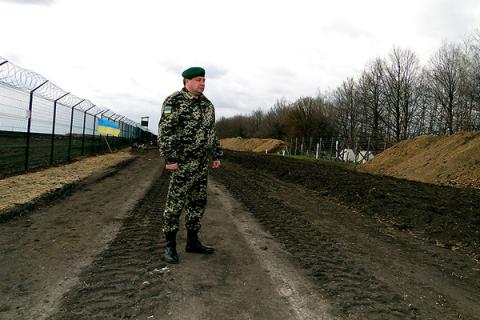KHARKIV, UKRAINE — It's been nicknamed the "Great Wall of Ukraine." Its planned combination of barbed-wire fences, watchtowers, berms, and tank traps along Ukraine's 1,300-mile border with Russia look like something you'd find on one of Israel's borders with its hostile neighbors.
If it's ever completed, the wall will seal a frontier that, until last year, had always been wide open. Inaugurating construction here last fall, Prime Minister Arseniy Yatsenyuk indicated that much more than just a physical barrier was intended. "This will be the eastern border of Europe," he said.
But in nearby Kharkiv, an overwhelmingly Russian-speaking city of one-and-a-half million, mention of the wall is mostly greeted with snorts of irritation. The idea of splitting permanently and irrevocably from Russia wins virtually no acceptance. Many people here have family and friends in Russia, the local economy is heavily dependent on trade with Russia, and some say they just can't wrap their heads around the idea of a frontier being there in the first place.
"The Russian city of Belgorod is an hour's drive away; until recently there were almost no border formalities. It's a scene of my childhood; I love that place," says Yury Smirnov, a taxi driver. "Now the border inspections take hours, and it's humiliating. Belgorod might as well be on the moon."
The tension between Kharkiv and Kiev is all too obvious these days. While pro-Kiev patriots are visible – groups of activists tore down three prominent Soviet-era monuments under cover of night last week – most conversations with people quickly reveal varying degrees of anger and disillusionment with the new revolutionary government. Everybody here, on both sides of the barricades, agrees that they are horrified by what's happening in next door Donbass and do not want to see the war come to Kharkiv. But experts from both sides of the argument admit it will be an uphill slog for Kiev to win their hearts, in part because of the economic crisis that many here blame on a government they never voted for.
"People in the western Ukraine are inclined to tighten their belts and think 'we're at war with Russia, of course there must be sacrifices.' But people here say, 'we lived better under [deposed President Viktor] Yanukovych, before these new people came,'" says Alexander Kirsch, a deputy of the Rada, Ukraine's parliament, who is from Kharkiv and an adviser to Prime Minister Yatsenyuk.
for the rest of this article, please go to http://www.csmonitor.com/World/Europe/2015/0422/Walled-off-In-non-rebel-eastern-Ukraine-frustrations-with-Kiev-mount


Spread the word